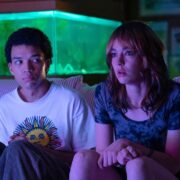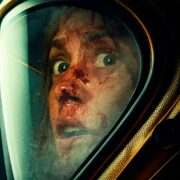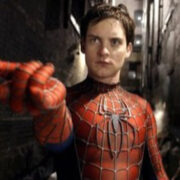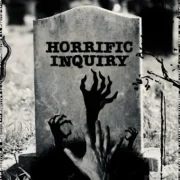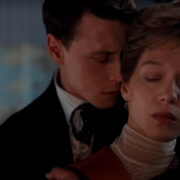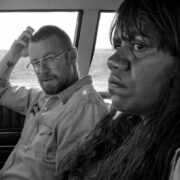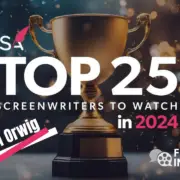Writer/Director Ruairi Robinson Makes A CORPORATE MONSTER
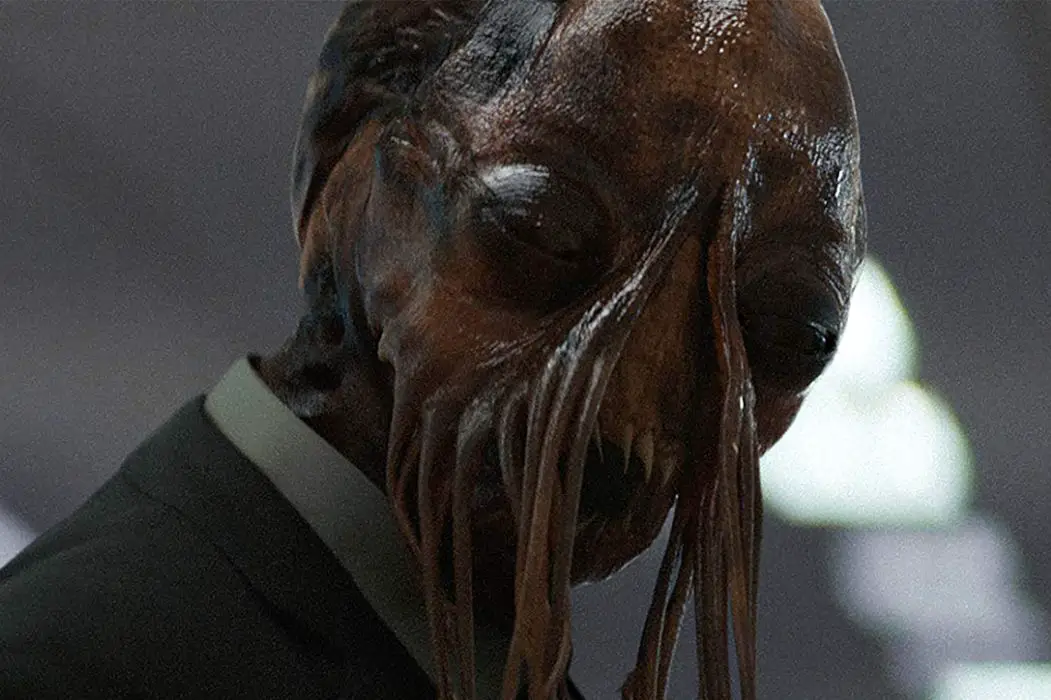
Jim Dixon retired from practicing law not a moment too…
Ruairi Robinson is an Irish filmmaker and CG artist based in Los Angeles. He divides his time between commercials and narrative filmmaking, both of which frequently feature animated CG creatures, large and small. Robinson began his film career in post-production and visual effects before moving into directing commercials and films. His first short film, Fifty Percent Grey, about a deceased soldier humorously trapped in a karmic loop, showed at over 70 festivals, including the Sundance Film Festival, and was nominated for an Academy Award for Best Animated Short Film.
His follow-up, The Silent City, starring Cillian Murphy, marked his transition into directing live action, and gained him representation in the US, and a development deal with Warner Brothers. In 2012 he won Best Narrative Film at the Vimeo Awards for his science fiction short film BlinkyTM (starring Max Records from Where the Wild Things Are). His debut feature film The Last Days on Mars (starring Liev Schreiber and Olivia Williams) was featured at Directors Fortnight in the Cannes Film Festival in 2013.
In Robinson’s new short film Corporate Monster, Kett Turton (iZombie) plays a man who has recently lost his job is given some pills—which haven’t been approved by the FDA—to help him cope with stress. After he starts taking them, he starts having terrifying, realistic visions of monsters everywhere, although no one else does.
Ruairi Robinson spoke exclusively with Film Inquiry.
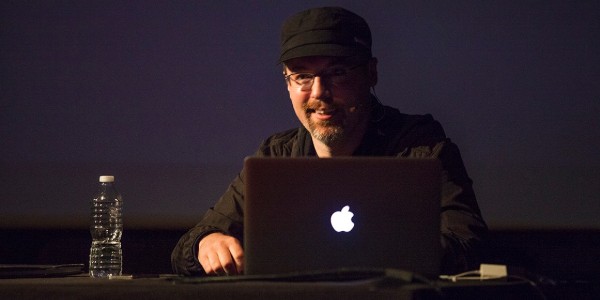
Jim Dixon for Film Inquiry: I hope you don’t mind if I record our talk, now that I’ve got my recorder going. I accidentally hit play on my little device instead of record, so all of a sudden I was getting myself.
Ruairi Robinson: Well, you know, if you’ve watched the film and read the disclaimers in the end credits, you already know you’ve already given me permission to record every activity you do in your life.
I actually watched it on my laptop, so I didn’t read the fine print in the credits as closely as I might have.
Ruairi Robinson: There’s some very, very bad terms and conditions in that thing [laughing].
I should have read more carefully.
Ruairi Robinson: It’s also retroactive as well, like after you’ve watched the film it tells you that you’ve given away these rights.
Obviously you’ve been taking your cues from all those little Terms and Conditions things we click online without reading them.
Ruairi Robinson: It’s an endless disclaimer of gibberish and nonsense. The disclaimer ends with “there really are monsters living among us and we’re all going to die.” [laughs]
Mitch McConnell Looks Like Cthulhu
I would like to thank you for making Mitch McConnell look like the demon God Cthulhu.
Ruairi Robinson: He’s not Cthulhu, he’s just one of the acolytes. Don’t exaggerate.
Well, Cthulhu is not the top of the heap, he’s just halfway up. But I did enjoy that. As soon as I saw that, I thought – Okay, this movie and I may get along.
Ruairi Robinson: I’m being accused of being too soft on Trump letting him off the hook. Being orange means bad—basic, simplistic. People are very assertive about their interpretation of exactly what the film is saying. And a lot of these interpretations are in direct contradiction, which is fascinating, because it’s kind of by design to hook a bit of the orange-means-bad brigade. I think I may have made a movie for the audience of nobody—just alienate everyone. [laughing]
I actually don’t believe that though. One, it’s too fast paced, too entertaining for people not to enjoy it. And one of the great joys of science fiction is asking “Okay, what’s the deeper point they’re trying to make?”
Ruairi Robinson: Yeah, yeah.
I realize you’re a bit younger than me, but \the original Invasion of the Body Snatchers, there was one crowd of people that said it was all about communist infiltration, and another crowd who said it was about the evils of the McCarthyism. And [director] Don Siegel didn’t think he was doing either.
Ruairi Robinson: I give a shout out to Invasion of the Body Snatchers in the credits as well, John Carpenter and a few other people.
You and I seem to like some of the same people.
Ruairi Robinson: And we dislike some of the same people, maybe—
Nod to John Carpenter’s They Live
Probably. [laughs] There were obviously some aspects of your movie that reminded me of John Carpenter’s They Live—
Ruairi Robinson: I loved They Live. It’s absolutely awesome. And I’m a huge Carpenter fan. I would say that The Thing is my favorite John Carpenter movie…They Live is a great idea and a great movie, but technically it’s a little dated. The creatures are a little cheap looking, I love the signs, they’re pretty iconic, but it’s not scary. And I always felt like the pill, [which I use instead of] the shades device had a sense of ambiguity, which I find really interesting. If someone asks, “Put on a pair of shades, take a look through these,” no problem. But if it’s a f*cking pill, you don’t know if it’s real or not.
That ambiguity was one of the things that really started to grab me. At first I thought, “Oh, this is a lot like They Live.” And then I thought, “Well, actually, though, because he’s on a drug he might be hallucinating.” Whereas with the sunglasses, you knew that he was seeing the real thing.
Ruairi Robinson: Yeah. Sort of allows me to tell a story in shades of gray, instead of just black and white, when nobody’s entirely off the hook. Even the hero in this film does some pretty f*cking terrible things that I don’t think that the film has you cheering for.
I am going to give you the Brass Balls of the Year Award for bringing in the mass shooting element.
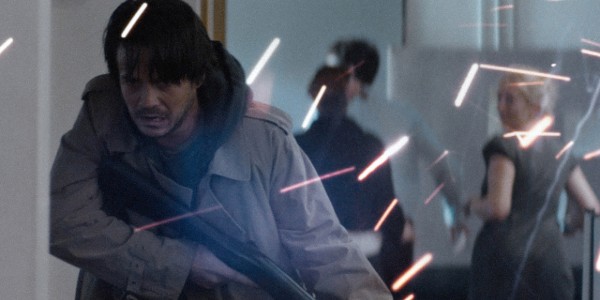
Things You Can’t Do in a Studio Movie
Ruairi Robinson: It’s one of those things where if you were doing this in a studio movie, forget about it. I mean, you know that movie The Hunt that just got its release cancelled a few weeks back? It was kind of an interesting time. The thing is that nobody’s really making any money off of the short. So, I’m free to put out stuff that if there’s a lot of money on the line, would be more constricted. Because nobody can cancel me—nobody can cancel this release. Nobody’s making any money. So there’s nobody that can be hurt. People can insult me, but it’s funny to me, because “sticks and stones,” you know?
This was described to me as a proof-of-concept short, so I’m assuming that you have some ambition to get this expanded into a feature.
Ruairi Robinson: I would love to, or a show or whatever. It’ll depend on the reaction to it. Like, if it’s kind of a hot button thing, that can be useful thing sometimes, and sometimes not. It kind of all depends on the reaction to it.
There’s a lot more story in here that I’d like to see. Like the character of the doctor—I found myself wondering there’s got to be more going on with him. I’m immediately fascinated with him—Why is he giving these unapproved pills out?
Ruairi Robinson: With the short films that I’ve created, I sort of create the tip of the iceberg of the story. And the rest of it is yet to be uncovered.
I loved your leading man, Kett Turton by the way. You’ve got a really good supporting cast, as well, all these people are very experienced.
Ruairi Robinson: Jenna Coleman is amazing. I’ve been watching her career trajectory shoot up into the sky.
So Shooting a Short Film Takes a Year on Two Continents…
Where did you shoot Corporate Monster?
Ruairi Robinson: We shot in Dublin and in Detroit. We shot all the interiors, the apartments in Dublin, and then all the exterior stuff in Detroit. Five days in each country, and yeah, it was awesome. It’s a international short film, as crazy as it is to do a film on this scale on a short film budget. I did most of the visual effects myself, I got some help, but most of it was just me, in my office at home, for basically the last year or so. Sort of a big gamble to spend this volume of time on something that has no guarantees success, and I’m not being paid for so—
Your creature makeup—and I’m assuming it’s makeup—is extraordinary. Or am I wrong? Is it makeup?
Ruairi Robinson: There’s no makeup in the film whatsoever.
Okay, so the creature faces are CGI?
RUAIRI ROBINSON: Yeah. Every single one of them. I did all the shots myself. I had a friend model the creature for me, and I had another friend rake the creature, but I put all the shots together. We shot with actors with a sock on their head. No masks, no physical anything. We could move fast because we didn’t have to get bogged down by makeup.
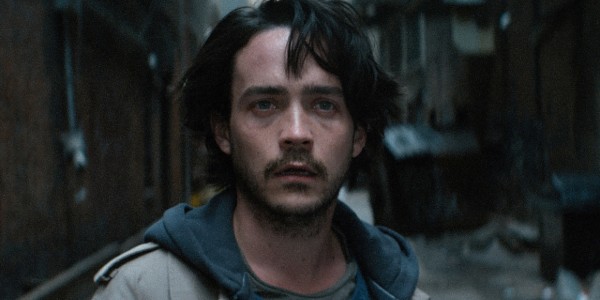
The finished product looks great. I mean, they look like faces. Assuming you got to do this, like you know as $100 million feature, would you would you still do your own creature faces?
Ruairi Robinson: If they want to pay me $100 million, I’d do whatever was required. But I would hope that it wouldn’t be required for me to be sitting around doing effects shots—very unhealthy work.
Not Aliens From Another World…They Were Here All Along
One other little reference that popped up to me while I was watching your movie, and I’ll date myself, but there’s a classic episode of the original Twilight Zone called “To Serve Man—”
Ruairi Robinson: I’ve seen it of course, and I love it. And it’s one of a huge number of, you know, refracting influences from many different angles. They’re not aliens, really in this short film. They’re basically parasitic beings that have been here all along. They’re not from another world. They’re from here. They’ve just been hidden due to the constraints of their specific ugliness, and evil, that stayed hidden in the shadows until now, and I think what I liked in the short was that technology has allowed them to walk among us for the first time.
And it seems that most of them seem to masquerade as Republicans or other guys that wear suits, except for the cops. The thought did go through my mind: “Well, I’d rather be one of the guys in the suits than the cops—all that running and shooting looks like a lot of work.” And I wondered how they divvy those roles up—
Ruairi Robinson: Well, you know, maybe there’s power politics between species, too—I just made it I just made it people with power.
Any Resemblance to H.P. Lovecraft is Absolutely Intentional
And that’s totally fair. Bearing in mind that these creatures have tendrils on the bottom of their faces, and we did mention Lovecraft and Cthulhu before, one might wonder if that was also an intentional nod to HP Lovecraft—
Ruairi Robinson: Fuck, yeah! One hundred percent.
Just by pure coincidence, I was actually wearing my Miskatonic University tee-shirt yesterday.
Ruairi Robinson: [laughs] I have one of those, too.
It’s one of my favorites. Mine’s blue to go with my eyes. So what was the biggest challenge making Corporate Monster, other than the ones you’ve already alluded to—like the fact that you weren’t being paid?
Ruairi Robinson: Well, I did a year’s work with no pay. So it was sort of a struggle and I thank my very generous wife for putting up with me. As far as technical difficulties, basically in a year of work, probably three-plus months was one shot. And it’s not a very effective distribution of time when it’s weighted so heavily on one challenge, which was in the office when the creature gets shot with a shotgun and his back explodes outwards. I could not figure out a way to do the flash simulation. It took me months, and it was really painful. And then as soon as the film was finished, a piece of software came out that would have made it easy.
It was a startling effect, and I did gasp when it happened, and I have seen my share of graphically violent movies.
Unconstrained by Corporate Sensibilities…
Ruairi Robinson: Well, the context is so horrifying, it’s sort of like impossible to find anyone to cheer for.
When I realized what your main character was up to, I thought, Oh, we really are going there. I was impressed by your audacity, and I do think it’s appropriate that we make movies about issues that are on people’s minds. And gun violence in America right now is something that is on people’s minds.
Ruairi Robinson: One of the things that’s been really kind of bummer about the movies that are being made is when they remake movies that have the nerve to remake something like Robocop—the original [Paul] Verhoeven Robocop does not pull any punches—and then the remake is PG-13. They just dampen everything. And I just kind of wanted to go the other way, and give credit and homage to all the movies I miss, because if nobody else is making them, then it sort of becomes my duty to fill in that gap somehow. I wanted to do They Live by way of Lovecraft, by way of 70’s paranoid thrillers, like The Conversation and The Parallax View and Klute—movies that have this strange and somber atmosphere and sense of dread—The Invasion of the Body Snatchers—the [Phil] Kaufman version—all those movies. They were my fast food, my formative years experiences.
I share your affection for them. As to the remakes of Robocop and Total Recall, I do think making a PG-13 remake of a Paul Verhoeven movie is just missing the point.
Ruairi Robinson: So without the constraints of anxious financiers telling me I can’t do the thing that’s right for the story—I was sort of unconstrained from those concerns.
It is interesting to see what happens filmmakers don’t have those corporate pressures coming to bear on them—sometimes you get much more interesting results. Roger Corman had to do everything fast, cheap and dirty, and those movies are still entertaining.
Ruairi Robinson: Oh, yeah—I just watched Galaxy of Terror again, recently. Entertaining, but the movie’s messed up! Have you seen that one?
Galaxy of Terror? No, I don’t think so, although the title sounds familiar—
Ruairi Robinson: A lot of these movies have multiple titles and they would reuse the sets or reuse the props and shoot the next one two weeks later. It’s got some scenes that I’m not even gonna describe—it’s got the girl from “Happy Days” [Erin Moran] having the skin ripped off her face.
Okay, I just made a note of that. I gotta see that.
Ruairi Robinson: If you scrape the bottom of the barrel of Amazon Prime for all the Alien knockoffs is in there. Anyway it was the last time I checked.
I’m going to look for it, I promise you. So what’s up next for you?
Ruairi Robinson: Well, I have a project with a large production company that I’m waiting on a deal close, which I can’t talk too much about yet, but it’s based on one of my other previous short films. And, and I have a script that I really love that was written by the writer of Love, Death and Robots, that I’d love to make this winter. We’ll see how it all goes.
Corporate Monster is available now free online at YouTube.
Does content like this matter to you?
Become a Member and support film journalism. Unlock access to all of Film Inquiry`s great articles. Join a community of like-minded readers who are passionate about cinema - get access to our private members Network, give back to independent filmmakers, and more.
Jim Dixon retired from practicing law not a moment too soon, and now works as a freelance writer and film critic. A lifelong and unrepentant movie geek, he firmly believes that everything you need to know in life you can learn at the movies. He lives in upstate New York.

